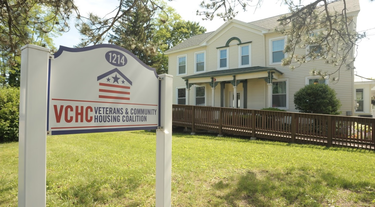Local group raising funds to house homeless female vets with children
CAPITAL REGION — The Veterans and Community Housing Coalition is closing in on the funding it needs to construct support-housing, among the first in the state, that would accommodate single female veterans with children, who, VCHC Community Relations Director Michelle Viola-Straight told The Enterprise this week, are often caught between getting the support they need as veterans and giving up their children.
Viola-Straight said that even the VCHC, which operates a shelter called Guardian House in Ballston Spa, has to turn away women with children because it receives funding from the United States Department of Veterans Affairs, which applies special conditions to the projects it funds.
“Time and time again we’ve seen women that are living in their cars or on couches and come to us for support,” said Viola-Straight, a Knox resident. “I can take that mom in but I can’t take the kids because it’s a VA-supported house and I have to follow their guidelines, so that mom is faced with something no woman, no veteran should ever have to [face].”
As a result, many women don’t seek out the assistance they need, Viola-Straight said.
To help the more-than-20 homeless female veterans with children who have been identified in the Capital Region, VCHC is attempting to raise $500,000 to build what it will call Foreverly House — a duplex that will provide two families with completely independent living for “anywhere from eight to 18 months,” Viola-Straight said, during which time VCHC will attempt to set the families up with a more stable system of supports than they had coming in.
Each duplex will have four bedrooms, a living room, dining room, kitchen, play-yard, and access to a shared playground, Viola-Straight said. That separation from other families will be important because “they’ve been through so much over so many years, and they have so many scars they have to work through, that they just need to feel secure,” she said.
And, once they get established with services like health care and are “completely set and stable,” Viola-Straight said, VCHC will move the families into permanent housing.
“We are about 75 percent of the way there in terms of fundraising,” she said, adding that the benefit of independent fundraising is that it allows VCHC to “create the perfect environment for a population that’s not getting any services.”
An unique complication in the lives of many of these homeless female veterans is that they live with trauma from rape and other forms of sexual assault, which is prevalent in the military, Viola-Straight said.
At a rate of roughly 25 percent, the odds that a woman in the United States military will experience sexual assault is higher than the odds that she would experience sexual assault outside of the military, and higher than the odds that any service member will be wounded by an enemy combatant.
“And 99 percent of the time, it’s your higher-up that is the assaulter,” Viola-Straight said. Add in a society that already views reports of sexual assault with a skeptical eye, many of these victims are given an “other-than-honorable discharge” if they speak out, which bars them from accessing the benefits granted to veterans who are granted an honorable discharge, she said.
“We actually have attorneys that we work with because a lot of men and women are labeled other-than-honorable when they come out for reasons that are just ridiculous, whether it’s sexual-identity issues, or somebody was raped or abused and [the military] just wants to get rid of them because they’re making too much noise or they’re too much work,” Viola-Straight said.
Those attorneys, she explained, can help victims of that system get benefits through the VA.
“Once this program is up and running and the community sees it, and more folks are aware of it, there are going to be many more female veterans who come forward and say ‘Yeah, I do need help,’” Viola-Straight speculated.
Origins
The name Foreverly for the house comes from a book written by the project’s chairman, Ray O’Conor, who is the former chief executive officer of Saratoga National Bank.
The book, “She Called Him Raymond,” is an epic World War II romance story about his mother and her first husband, a B-17 pilot who was killed on their first wedding anniversary, which was also his mother’s 19th birthday, O’Conor told The Enterprise this week.
After the book was published, a musician named Jeff Brisbin approached O’Conor asking if he was the author, and said that he had written a song called “Foreverly” that “fit the story like a hand-in-glove,” O’Conor said. An adapted screenplay of the book is currently using “Foreverly” as a working title, he said.
O’Conor got involved with VCHC when, during a breakfast meeting with the group’s executive director, Cheryl Hage-Perez, she mentioned, “There’s no facility anywhere for women who are coming out of the military who have children to get the services they need to make the transition to civilian life,” he recalled.
In addition to fundraising done at the annual Veterans Ball in Saratoga Springs, O’Conor said, “We’ve been fortunate to get some very substantial commitments from generous, good-natured folks who liked the project.”
Progress was delayed because of the pandemic and concurrent issues with the supply chain and inflation, O’Conor said, but he’s “99 percent certain” that they’ll reach the goal this year.
“In November we’ve got the Veterans Ball coming up, which is sold out every year that we’ve done it, and that’ll give us a nice boost to get much closer to the finish line,” he said.



